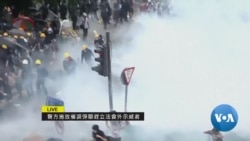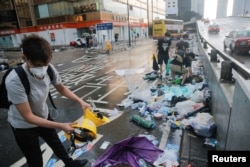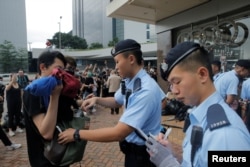Anna Kook English to Asia Service and VOA Mandarin Service contributed to this report.
HONG KONG, STATE DEPARTMENT — A semblance of normalcy returned to Hong Kong Thursday after clashes between police and protesters who oppose a controversial extradition bill that would allow criminal suspects to be sent to mainland China for trial.
Protesters packed up the last few remaining boxes of supplies at Hong Kong’s Statue Square early Thursday as riot police stood by looking on.
Heavy rain Thursday morning kept fresh protests from following those Wednesday by thousands of activists who shut down government headquarters and the Legislative Council on the day it was to debate the extradition bill. Officers wearing helmets and carrying shields fired tear gas, rubber bullets and pepper spray to push back protesters, some of whom overturned barricades and threw objects at police. Hospital authorities say at least 72 people were injured.
WATCH: US Lawmakers Call on Hong Kong to Withdraw Extradition Bill
Debate postponed
The demonstrations forced the legislature to postpone Wednesday’s session at which lawmakers were scheduled to debate the proposed legislation. The Legislative Council said Thursday no time has been set aside for debate on the legislation.
Protester Katie Lam said she and others were waiting to regroup for news that the legislature was moving forward with the legislation.
While the government announced that the Legislative Council and government officers were closed Thursday, Lam said demonstrators were preparing to react if events changed.
“The [legislative] president has the right to open a meeting at any time, so we are preparing for a protest later once a meeting is open,” Lam said.
The prospect of extradition to China, which has a substantially different legal system, has alarmed a wide cross section of Hong Kong, from international business groups to legal societies and pro-democracy parties.
The protests Wednesday were strongly reminiscent of the 2014 democracy protests, with a stronger sense of both anger and determination. While they succeeded in delaying its second reading for now, leader Carrie Lam has indicated that she will not back down.
In a statement to the Hong Kong public late Thursday, Lam chastised protesters for orchestrating what she called a violent riot but did not indicate the government would back down on amending its extradition law proposal.
“I understand that the amendment … has drawn strong positive and negative opinions in society and the government has actively responded and explained many times,” she said.
“The fact is that since the return to the Motherland, issues involving ... the Mainland and Hong Kong, will be used by some people to stir up controversies and disputes,” she added.
In Washington, U.S. President Donald Trump said he was sure China and Hong Kong would be able to “work things out” after the mass protests turned violent.
“That was a million people. That was as big a demonstration as I’ve ever seen,” Trump told reporters at the White House. “I understand the reason for the demonstration but I’m sure they will be able to work it out. I hope they’re going to be able to work it out with China,” Trump added.
At the State Department, spokesperson Morgan Ortagus encouraged all sides to refrain from violence.
“We think that these peaceful protests are incredibly important, and it’s important for the Hong Kong government to respect these freedom of expressions, respect the right of people to peacefully assemble,” she said during a Wednesday briefing.
Ortagus said people are protesting the proposed extradition legislation “because they don’t want to be subjugated to the Chinese as it relates to some of their fundamental rights.”
US lawmakers
On Capitol Hill, members of the U.S. Senate spoke with VOA Wednesday about the protest.
“I think it’s very regrettable what mainland China is trying to do with that law against the people of Hong Kong and their autonomy, so I certainly understand the people of Hong Kong’s desire to maintain their autonomy. It’s unfortunate what mainland China is doing,” said Wisconsin Republican Sen. Ron Johnson.
“We certainly follow that and we are aware of challenges in regards to China’s failure to live up to all the commitments they made internationally to Hong Kong and to people of China,” said Sen. Ben Cardin, a Democrat from Maryland.
Massachusetts Democratic Representative Jim McGovern told VOA a bipartisan bill will be introduced, possibly Thursday, to address U.S. concerns about freedom and autonomy in Hong Kong.”It will raise the standard for whether Hong Kong is sufficiently autonomous in order to receive the special economic and trade benefits that are currently gets,” McGovern told VOA.
The proposed changes to Hong Kong law have attracted criticism from the international community, including the United States. China accused the United States Tuesday of interfering in its internal affairs. Beijing characterized the largely peace protests in Hong Kong as a “riot” and accused the demonstrators of committing “violent acts.”
Hong Kong, a former British colony, was granted special autonomy for 50 years after it returned to Chinese sovereignty in 1997. But many in Hong Kong are concerned that China is slowly encroaching on those rights and tightening its grip on the territory.
The so-called Umbrella Movement protests were launched in 2014 to demand the direct election of the city’s top leader after China reneged on promises of universal suffrage by 2017. The protests ended without winning any concessions from the Hong Kong government.









